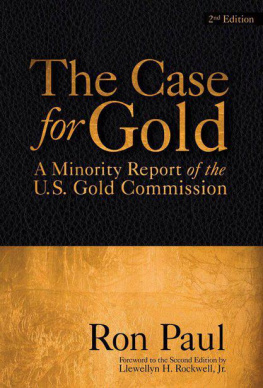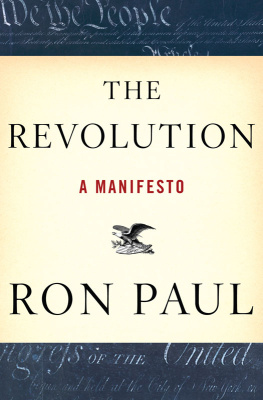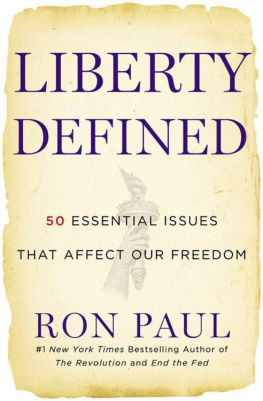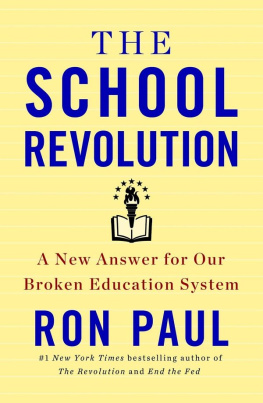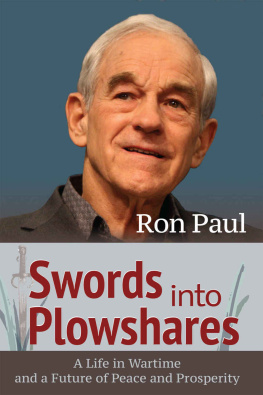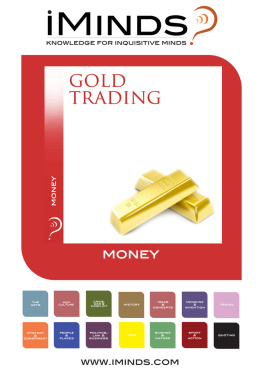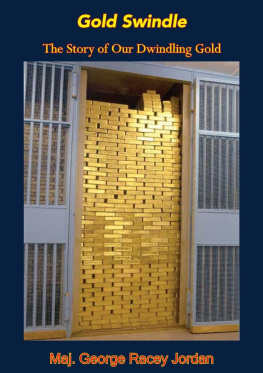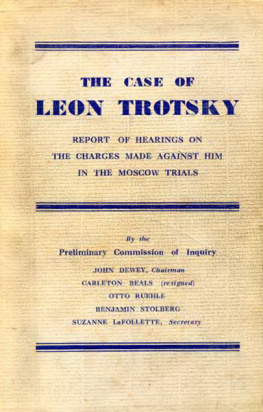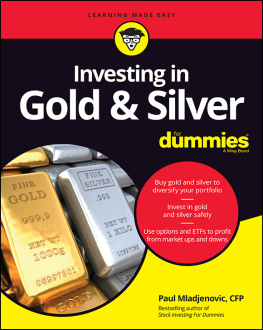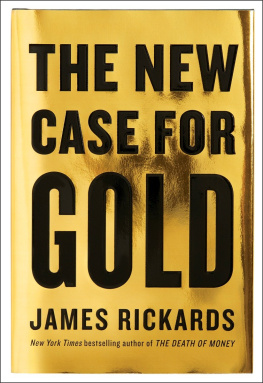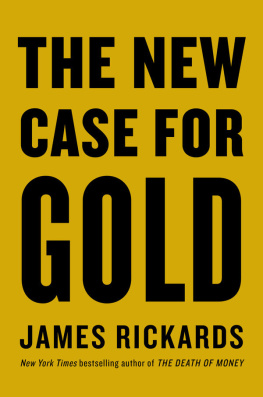Ron Paul - The Case For Gold: A Minority Report of the U.S. Gold Commission
Here you can read online Ron Paul - The Case For Gold: A Minority Report of the U.S. Gold Commission full text of the book (entire story) in english for free. Download pdf and epub, get meaning, cover and reviews about this ebook. year: 2010, publisher: CATO;The Ludwig von Mises Institute, genre: Science. Description of the work, (preface) as well as reviews are available. Best literature library LitArk.com created for fans of good reading and offers a wide selection of genres:
Romance novel
Science fiction
Adventure
Detective
Science
History
Home and family
Prose
Art
Politics
Computer
Non-fiction
Religion
Business
Children
Humor
Choose a favorite category and find really read worthwhile books. Enjoy immersion in the world of imagination, feel the emotions of the characters or learn something new for yourself, make an fascinating discovery.
The Case For Gold: A Minority Report of the U.S. Gold Commission: summary, description and annotation
We offer to read an annotation, description, summary or preface (depends on what the author of the book "The Case For Gold: A Minority Report of the U.S. Gold Commission" wrote himself). If you haven't found the necessary information about the book — write in the comments, we will try to find it.
The Case For Gold: A Minority Report of the U.S. Gold Commission — read online for free the complete book (whole text) full work
Below is the text of the book, divided by pages. System saving the place of the last page read, allows you to conveniently read the book "The Case For Gold: A Minority Report of the U.S. Gold Commission" online for free, without having to search again every time where you left off. Put a bookmark, and you can go to the page where you finished reading at any time.
Font size:
Interval:
Bookmark:
THE CASE FOR GOLD
A Minority Report of the U.S. Gold Commission Second Edition
Rep. Ron Paul and Lewis Lehrman
THE LUDWIG VON MISES INSTITUTE
AUBURN, ALABAMA
2007

Library of Congress Cataloging in Publication Data
Paul, Ron, 1935
The case for gold.
ISBN 0-932790-31-3
S ECOND E DITION
Originally published in the Congressional Record, Government Printing Office, Washington, D.C., 1982. Republished by the Cato Institute, 1982, with a second printing in 1983.
CONTENTS
Acknowledgements
The authors would like to thank Christopher Weber, Murray Rothbard, and John Robbins for their assistance in researching, drafting, and editing this report.
FOREWORD
More and more people are asking if a gold standard will end the financial crisis in which we find ourselves. The question is not so much if it will help or if we will resort to gold, but when. All great inflations end with the acceptance of real moneygoldand the rejection of political moneypaper. The stage is now set; monetary order is of the utmost importance. Conditions are deteriorating, and the solutions proposed to date have only made things worse. Although the solution is readily available to us, powerful forces whose interests are served by continuation of the present system cling tenaciously to a monetary system that no longer has any foundation. The time at which there will be no other choice but to reject the current system entirely is fast approaching. Although that moment is unknown to us, the course that we continue to pursue will undoubtedly hurtle us into a monetary abyss that will mandate a major reform.
That moment may come very soonit nearly arrived in the 1979 dollar crisisbut I hope it will not arrive for several years. That way a greater understanding among more people will prompt a wiser choice in establishing the new order. The minority views of the Gold Commission deal precisely with this task. In planning for a constructive monetary reform the errors of the past and the myths that have evolved around money must be fully understood and explained. In this report we have made an effort to analyze the American experience with gold and to refute the cliches used to condemn the use of gold as money. No one program is indispensable in outlining the transition from paper to gold. Every day conditions are different. Today we need a program different from the one necessary three years ago, and in three years the conditions again will change. We certainly do not have the same problem faced by the Germans in 1923, but in 1986 we may. Nevertheless, outlines of different methods of achieving a convertible currency can be made; we have done so in these views.
Briefly, we offer two methods, one through the legalization of competing currencies, the other a government-directed gold standard of the classical variety. Only future events and attitudes will determine the best method. We do know that current monetary policy cannot continue indefinitely, and we are obligated to prepare for better times. This report establishes the foundation on which a sound monetary system can be built.
The date the Gold Commission officially voted and rejected the gold standarda foregone conclusion from the very beginningthe Wasnington Post headline read, Commission Votes Against Revival of Gold Standard. A reporter called to ask my reaction, assuming I would be greatly disappointed. But my response was the opposite. Im delighted, I said, the news is that the gold standard was considered and the (temporary) rejection deserves a top front page headline by the Washington Post. The fact that for the first time in over 100 years a government body was seriously discussing the issue of gold as money is a major achievement. It may even be argued that this was the most significant discussion since the Constitutional Convention when the Founding Fathers condemned the Continental and tried to protect us from the ravages of another political currency. Even the 25 volumes published by the National Monetary Commission in 1912 largely avoided the issue of money and concentrated only on banking procedures. Yes, the news on the gold standard was noteworthy, but not quite for the reason suspected by the Washington Post.
Making a significant change in policy takes time and effort. Rejecting the paper standard will not occur overnight. The destruction of the dollar, once as good as gold, literally took 58 years (19131971). Paper did not defeat gold in one battle. Gold will achieve success in a shorter period. Already the initial steps have been taken. Legalization of gold ownership in 1974 (thanks to Philip Crane, Jesse Helms, and others) and of gold clause contracts in 1977 have certainly been positive developments. The gold coin as recommended by the Gold Commission is another major step in creating a climate for general acceptance of a gold standard. A U.S. gold coin minted by the U.S. Treasury for the first time in 50 years is a significant event and heralds a new era in U.S. monetary history.
The debate in the news media that accompanied the establishment of the Gold Commission made millions of Americans aware of the issue. This public attention will, in the long run, be quite beneficial and is absolutely necessary before gold is generally accepted as money once again.
This report makes the point that we need not return to a gold standardwhich had many shortcomingsbut we can learn from the mistakes of the past, improve upon past systems, and go forward to a modern gold standard. By contrast, all the effort and planning imaginable cannot make paper money work. There is no way paper can be improved as money. Whenever governments are granted power to purchase their own debt, they never fail to do so, eventually destroying the value of the currency. Political money always fails because free people eventually reject it. For short periods individual countries can tell their citizens to use paper, but only at the sacrifice of personal and economic liberty.
Governments can fool people for a while with paper money, but its inevitable that trust in the moneysomething absolutely required for it to serve as a medium of exchange and to allow economic calculationwill be lost. Governments have power to declare paper to be legal tender, but they do not have power to make that money trustworthy. As governments more and more insist on paper alone serving as money, less and less trust is placed in it. Its hardly a surprise that the decade of the 1970s, a decade of paper money, has brought us the decade of the 1980sa destroyed bond and mortgage market, persistent and devastatingly high interest rates, and a faltering economy.
If the nature of money is understood and one observes how the destruction of money occurred during the past 50 years, and especially during the past 10, its easy to see why interest rates are high. Most people today see the economic problems we face as the result of high interest rates and a shortage of money, yet the high interest rates are merely symptoms of an untrustworthy currency. When one deals with currency that has no predictable value and in the long run is steadily depreciating, a shortage will always occur. The shortage, however, is in purchasing power and trust, and not in nominal dollars. Ironically, the more dollars created to satisfy this shortage, the greater is the loss of purchasing power and trust.
This report was written to demonstrate as clearly as possible the choices available to us: political (paper) money or commodity (real) money. It is imperative that we make it clear to the American people the alternatives they have, and that they make the correct choice. Making the wrong choice will jeopardize our political freedom and destroy the possibility of restoring a truly productive economy. Making the correct choicelimited government, free market, private property, and sound moneyensures liberty and prosperity.
Next pageFont size:
Interval:
Bookmark:
Similar books «The Case For Gold: A Minority Report of the U.S. Gold Commission»
Look at similar books to The Case For Gold: A Minority Report of the U.S. Gold Commission. We have selected literature similar in name and meaning in the hope of providing readers with more options to find new, interesting, not yet read works.
Discussion, reviews of the book The Case For Gold: A Minority Report of the U.S. Gold Commission and just readers' own opinions. Leave your comments, write what you think about the work, its meaning or the main characters. Specify what exactly you liked and what you didn't like, and why you think so.

